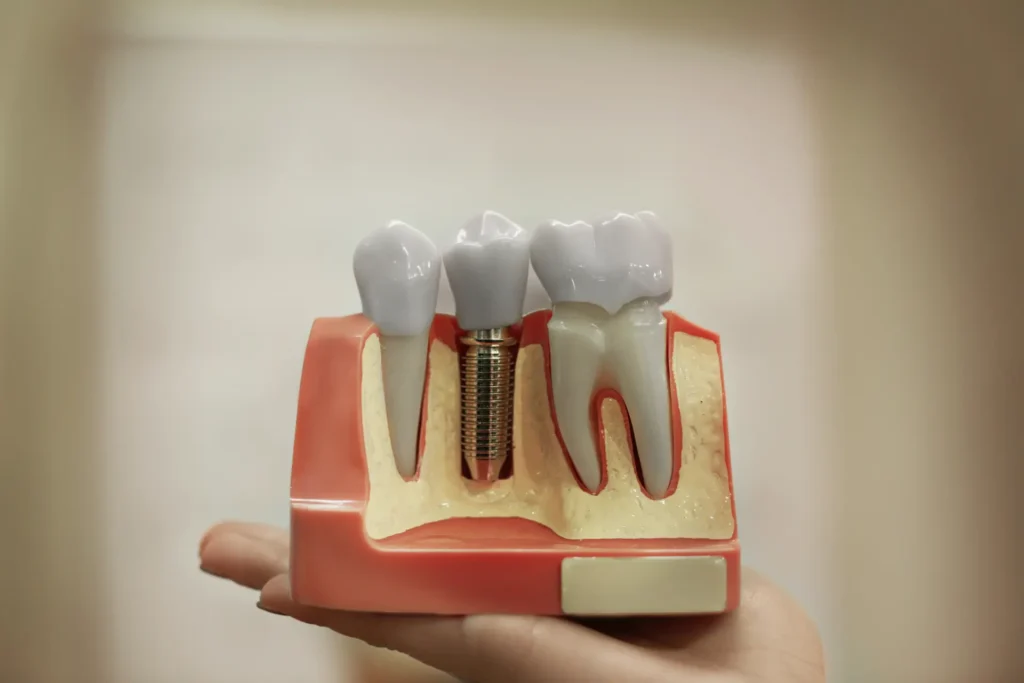Dental implants are a modern tooth replacement option that can provide improved aesthetics and function. They are popular for people with missing or damaged teeth who want a secure, long-lasting solution.
Understanding the signs of potential dental implant failure is essential for successful long-term outcomes. Early detection and intervention are key in preventing costly and extensive repair work. This blog will help you determine the signs of dental implant failure, so you can catch any early warnings that your implant is failing before it becomes a costly problem to try to fix.
Understanding Dental Implant Failure
Dental implant failure can occur when an implant does not properly integrate with the surrounding bone tissue, resulting in instability and discomfort. Infection is another cause of implant failure and can happen when there is insufficient bone to support the implant or when bacteria enter the implant site. Understanding the signs of dental implant failure is essential for successful implant treatment, so let’s take a closer look at them.
7 Signs and Symptoms of Dental Implant Failure
Dental implants are a great way to restore the look and feel of teeth, but like any other medical procedure, there is a risk of complications. Take a look at the following signs and symptoms that could tell you your dental implant is failing, so you can take action as soon as possible.
1. Persistent pain and discomfort
When an implant fails, the patient may experience ongoing pain or discomfort around the implant site. This can be a sign of infection or simply a lack of osseointegration. If the implant is loose or unstable, it may need to be removed and replaced to restore comfort and stability.
2. Swelling and inflammation around the implant site

Persistent swelling and inflammation around the implant site can be signs of infection or peri-implantitis. In this condition, the tissue around the implant becomes inflamed due to an overgrowth of bacteria. This can lead to implant failure and should be addressed as soon as possible to protect the implant and surrounding tissue.
3. Receding or bleeding gums
One of the most common signs of dental implant failure is receding gums or bleeding around the implant area. A bacterial infection can cause this or a sign that the implant is not properly integrated into the bone. If you experience any of these symptoms, you must contact your dentist as soon as possible to assess the situation.
4. Loose or wobbly implant
Another sign of dental implant failure is a loose or unstable implant. This could be a sign of implant failure or inadequate bone integration. If the implant does not feel secure, it could be a sign that it has not properly bonded to the bone, and corrective measures should be taken as soon as possible.
5. Changes in the implant’s appearance
It is also important to be aware of any changes in the implant’s color, shape, or texture or surrounding tissues. This could signify complications and should be evaluated by a dental professional as soon as possible.
6. Persistent bad breath or unpleasant taste
Chronic bad breath or an unpleasant taste in the mouth may be the first signs of infection or other problems around dental implants. Bacteria can accumulate around the implant and cause inflammation of the surrounding gum tissue, known as peri-implantitis. This inflammation can cause bad breath and a foul taste in the mouth. If left untreated, peri-implantitis can lead to implant failure.
7. Difficulty or pain while chewing
Difficulty or pain while biting or chewing can suggest implant failure or other issues. Pain while biting or chewing is usually caused by the implant not being properly integrated into the bone, which can lead to further damage and implant failure. If pain while biting or chewing persists, it is important to consult a dental professional as soon as possible.
Early Warning Signs vs. Late-stage Implant Failure

The difference between expected post-implant healing and warning signs of potential complications can be difficult to discern. Keep in mind that some pain or swelling is normal after an implant procedure and should gradually decrease as the body adjusts to the implant. However, if the pain or swelling persists or worsens, it could indicate infection or implant failure and should be discussed with a dental professional immediately.
Early Signs
Patients with dental implants may experience some mild discomfort, gum inflammation, swelling, and bleeding at the implant site. These may be signs of early-stage implant failure.
Late Signs
Severe symptoms of dental implant failure may include severe pain, implant mobility, visible bone loss, and infection. If any of these symptoms are present, it is important to seek professional medical help immediately.
When to Seek Professional Help
Routine maintenance visits are the best way to detect potential problems with dental implants before they worsen and require more extensive treatment. Early detection is key to keeping dental implants healthy and functional for years to come.
If you experience any concerning signs or symptoms of implant failure, such as pain, swelling, or infection, you must seek professional evaluation from a dental specialist. Prompt diagnosis and treatment can help prevent further damage and ensure the best outcome for your implant.
At Hanna Dental Implant Center, our specialists use a variety of diagnostic procedures to evaluate the health of dental implants, including X-rays and implant mobility tests. We are committed to providing our patients with the best care and utilizing the latest technology to ensure their implants are healthy and functioning properly.
FAQs
How do you know when a dental implant is failing?
Signs of dental implant failure can include pain, inflammation, infection, and implant loosening. Other signs may include a change in the gum line or changes in the color of the implant. If you experience any of these signs, contacting your dental professional as soon as possible is best.
What is the most common cause of implant failure?
The most common cause of dental implant failure is infection. This can be caused by poor oral hygiene, not following your dental professional’s instructions, and not attending regular check-ups. It is important to maintain excellent oral hygiene and follow the instructions of your dental professional to reduce the risk of implant failure.
Can an X-ray show if a dental implant is failing?
Yes, an X-ray can help determine if a dental implant is failing. The X-ray can provide insight into the implant’s condition and show any changes in the implant that may indicate failure.
Can a dental implant be fixed if it fails?
Yes, it is possible to fix a failing dental implant. Depending on the severity and cause of the failure, the implant can be replaced, or other treatments may be necessary. Your dental professional can advise you on the best course of action for your particular situation.
What Is a Bone Graft for a Dental Implant?
A bone graft is a common procedure used to restore the jawbone to build a proper foundation for a dental implant. This procedure can be done surgically or with tissue-stimulating proteins and is necessary when the jawbone has deteriorated due to periodontitis, trauma, or congenital defects. Bone grafts are a safe and effective procedure that can help ensure a dental implant’s long-term success.
At Hanna Dental Implant Center, we have the expertise and experience to perform bone grafts for dental implant procedures in Houston. With our patented innovations in the dental implant industry, you can trust that you’re getting the highest quality of care available.
Contact us today to learn more about dental implant bone grafts and how we can help you achieve a beautiful and healthy smile.



